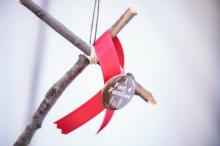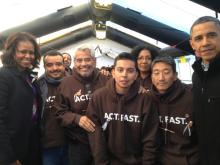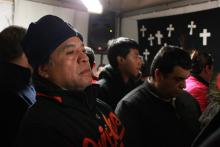This article is a response to CT’s November 2015 cover story, “The Power of Our Weakness.”
"There remains an experience of incomparable value. We have for once learnt to see the great events of world history from below."

This article is a response to CT’s November 2015 cover story, “The Power of Our Weakness.”
"There remains an experience of incomparable value. We have for once learnt to see the great events of world history from below."

When I was 15, I stepped into a warm bath on my church's sanctuary stage. I was a bit of an outsider - the occasionally bullied Chinese-American kid in the white suburb - and I had found a place of belonging at this Chinese immigrant church. I made a joke about how I felt the same way about my new faith as my 16-year-old friend felt about her new driver's license: I had no idea how I ever lived without this. Even my pastor chuckled as he clasped my hands, preparing to dunk me.

Who your neighbor is and how you should treat them were topics addressed by keynote speaker Lisa Sharon Harper at Saturday's Summit on Race, Poverty and Inequality held at the Henderson Fine Arts Center.

An enthusiastic crowd of 11,000 ticketed guests gathered on the South Lawn of the White House this morning as President Obama officially welcomed Pope Francis to the United States.
Among the overwhelmingly Catholic audience there to greet him on his first US visit was a smattering of evangelical leaders.

The shooting at Emanuel AME Church in Charleston, South Carolina, earlier this summer has been deeply troubling to us and other people of faith in Anderson Township.

In 1851, attendees of a feminist convention gathered in a packed hall in Akron, Ohio. It was a time when — even in the midst of a fight for women's rights — mostly men spoke. They talked of dainty women — delicate and deserving of special protection.


Sojourners’ senior director of mobilizing Lisa Sharon Harper interviewed Rev. Dr. William Barber II on Jan. 21 about his new book, Forward Together, which chronicles the Moral Mondays movement in North Carolina. Rev. Barber tells the story of this “fusion” movement that brings together environmental activists, criminal justice reform advocates, minimum wage organizers, and others to further a comprehensive agenda for equality. Rev. Barber states:
“The people fighting public education are the same people fighting criminal justice reform. The same people fighting criminal justice reform are fighting voting rights. The same people fighting against voting rights are fighting LGBT rights and women rights, and the same people fighting those are fighting environmental rights. If the extremists are cynical enough to come together, we ought to be smart enough to come together.”
“Coming together” for progress may sound like a cliché call for bland unity. But Rev. Barber presents this as a shrewd strategy toward passing legislation and creating mass action. Watch the Google Hangout below/above to hear more of Rev. Barber’s reflections on movement building and sustaining. You can join the next Moral Monday march on Valentine’s Day, February 14, 2015 in Raleigh, NC. Click here for more details.
Editor’s Note: On Monday night, it was announced that a grand jury in St. Louis County found no probable cause to indict Ferguson, Mo., police officer Darren Wilson on any of five possible counts. Throughout the country, protests have erupted. For this week’s edition of the Weekly Wrap, we wanted to offer you the 10 most important things you should see, read, digest to understand the situation. We pray for peace.
1. Letter From Birmingham Jail
by Martin Luther King Jr. Far more relevant than it should be. Print it out. Write on it. Pray through it. "In the midst of blatant injustices inflicted upon the Negro, I have watched white churchmen stand on the sideline and mouth pious irrelevancies and sanctimonious trivialities."
2. PHOTOS: Scenes From Ferguson — and Beyond
Slate compiled these chilling shots from protests in Ferguson, New York City, Los Angeles, Washington, D.C., and more.
3. A Sad Night for America
“It is time to right the unacceptable wrong of black lives being worth less than white lives in our criminal justice system." our criminal justice system."







I stood in line and waited until they called my number.
“Neeeext,” the woman behind the counter called!
The woman put out an energy that dared anyone to cross her, challenge her, even speak to her. She gave me a pile of papers to fill out “over there,” she waved her hands dismissively in the general direction of all the other losers sitting in rows of old school desks — the kind where the chair and the desk are attached. They were all fully engrossed in one task: filling out their unemployment insurance applications. I joined them.
Of course we weren’t losers, but it felt like we were. We were grown adults. We represented many races: white, black, Latino, and Asian. We represented a small fraction of the sea of people who were out of work at the height of the economic crisis. If you had come to us only weeks before we were school teachers and firemen, opera singers, Wall Street brokers, and justice advocates (like me). But now we were all numbers, experiencing the same humiliating moment together.
But, how much more humiliating it would have been to be thrown out of my apartment? How much more dehumanizing would it have been to become homeless or go without food?

To join Jim Wallis in prayer and fasting, click here.
I was grateful to be at the beginning of the Fast for Families on November 12. Courageous leaders from many communities were making an incredible sacrifice to remind our leaders what is really at stake in the fight for immigration reform. It was an honor to commission the core fasters, such as my Sojourners’ colleague Lisa Sharon Harper and Eliseo Medina, a veteran organizer and a disciple of Cesar Chavez, by placing crosses around their necks as they began abstaining from food.
After 22 days, the core fasters had grown weak, nearing the point of medical danger. When they decided to pass the fast to a new group, I was humbled to join the effort this way. On Tuesday, in the shadow of the U.S. Capitol, I received the cross from Eliseo that I had given to him three weeks before.
At Tuesday’s ceremony, each of us shared why we were committing to this discipline and willing to subsist only on water for various lengths of time.

Sapped by three weeks of a water-only diet, three activists for immigration reform ended their fasts Tuesday with a morsel of bread blessed by a priest and “passed the fast on” to others who hope to keep attention focused on the issue.
“You have truly put your faith in action,” said retired Washington Archbishop Theodore McCarrick, one in a small crowd of political and clerical dignitaries who came to the National Mall to praise those who have gone without food in a bid to pressure Republican House leaders to pass an immigration reform bill.
Also seated alongside the quiet and wan fasters: House Minority Leader Nancy Pelosi; the Rev. Bernice King, the daughter of the Rev. Martin Luther King Jr.; Secretary of Labor Tom Perez; Rep. John Lewis, D-Ga.; and the Rev. Al Sharpton.
In recent weeks, the fasters have attracted high-profile visitors, including President Obama, first lady Michelle Obama, and Vice President Joe Biden, to the heated tents where the fasters have been living on the National Mall.

I moved into the fasting tent Wednesday morning, Day 16 of my Thanksgiving Fast4Families. I’m now able to drink only water. Committed to fast as long as my body holds out.
The rain Wednesday mixed with snow pelted the tent from all sides. Sometimes the whole tent even swayed in the wind. The fasters sat in their chairs, some having just arrived, a few having lived in the same chair for 16 days now.
We’ve had multiple visitors; a Spanish language television station, a former senator’s top aide who is also the father of one of the fasters, another television station, and a crew of photographers that took our picture for a Thanksgiving Tweet. All that before 2 p.m. on Wednesday.
But the best part has been the fellowship and the discipline of silence.